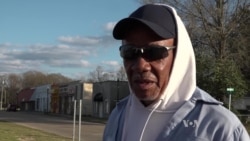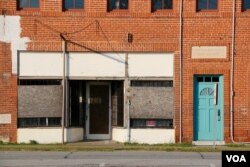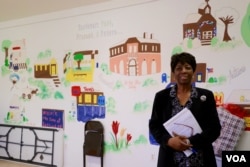In Eastover, South Carolina — population 813 — campaign messages of hope and change are lost on retired concrete pipe worker Wesley Washington.
"Everybody wants change, but change for what? It's supposed to change for the better, but it hasn't really changed. [It's] changed for the worst," Washington said as he sat in his pickup truck, parked next to railroad tracks that run through the rural town.
As Democratic presidential candidates battle for the minority vote, the residents of this majority African-American town say they have more pressing needs that go beyond political campaigns.
"This election, and I hate to say it, they don't have the enthusiasm that I feel that they need to support any candidate," Eastover Mayor Geraldene Robinson said of the residents. "They are so far removed from what services that they are expecting to receive, they don't feel that this is going to impact them."
Small-town issues
Just a 30-minute drive from Columbia, the town of Eastover could not seem more disconnected from South Carolina's bustling state capitol.
There is no grocery store or high school, and the one bank on Main Street closed its doors in 2014.
Robinson remembers a different time and a different town — one that thrived during her childhood.
"You had clothing stores; you had drug stores. So you had a town that could employ people at that particular time. But right now you really don't have that," the lifelong Eastover resident said.
Robinson, like many African-Americans in South Carolina, says education, employment and health care are most important to her. She supports former Secretary of State Hillary Clinton for president.
"I like her background,” Robinson noted. “She just didn't start working today. She was working with those who were truly impoverished and in need through all of her life."
Appealing to African-Americans
While Democratic candidate Senator Bernie Sanders has drawn support from young people, Clinton enjoys the significant backing of African-Americans. In a Feb. 19 poll, she led Sanders by 66 points among African-Americans over 45 years old.
University of South Carolina African-American Studies professor Todd Shaw says the support of African-American women like Robinson, who mobilize fellow community members to get out the vote, is a key demographic for Clinton.
"It's no mystery as to why Hillary Clinton made an appeal to a historic African-American sorority, why she showed up with the mother of Sandra Bland, the mother of Trayvon Martin as individuals who are endorsing her," Shaw said. "She knows she can link the concerns that African-American women would have about racial justice with being mothers, with being women."
But Shaw notes that while both Clinton and Sanders have addressed issues that matter to African-Americans — like criminal justice reform or unemployment — they both face the same challenge.
"Each of them is making a genuine effort, but they are not Barack Obama,” Shaw said. “And so I think, in some regards, confronting that history or confronting the fact that they are making a different type of history, is an issue. And they also have to be careful about being seen in this way of simply pandering."
Back in Eastover, just the mention of Obama and his last year as president makes resident Jenkins Reese wistful.
"The economy has been totally different since he has been here. Obama health care made a big difference. All of the folks couldn't afford health care. Now we can have it," the grandfather said.
Reese says he hopes the next president continues the progress seen under Obama, but he — like many in the small town of Eastover — is not expecting much to change.








